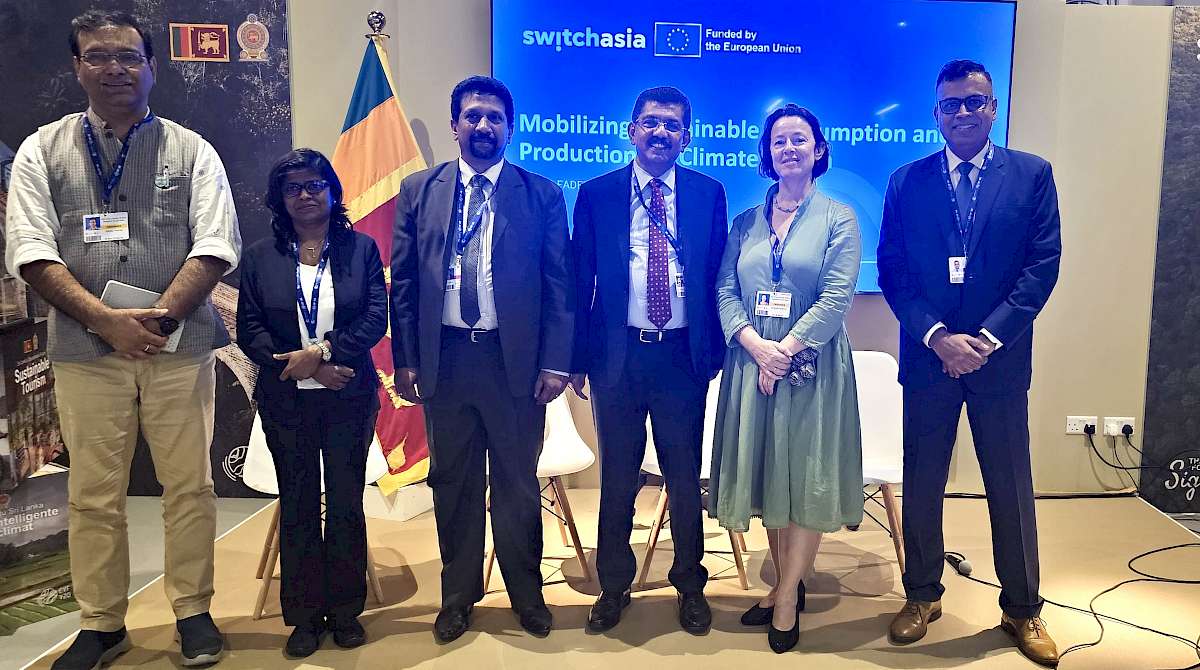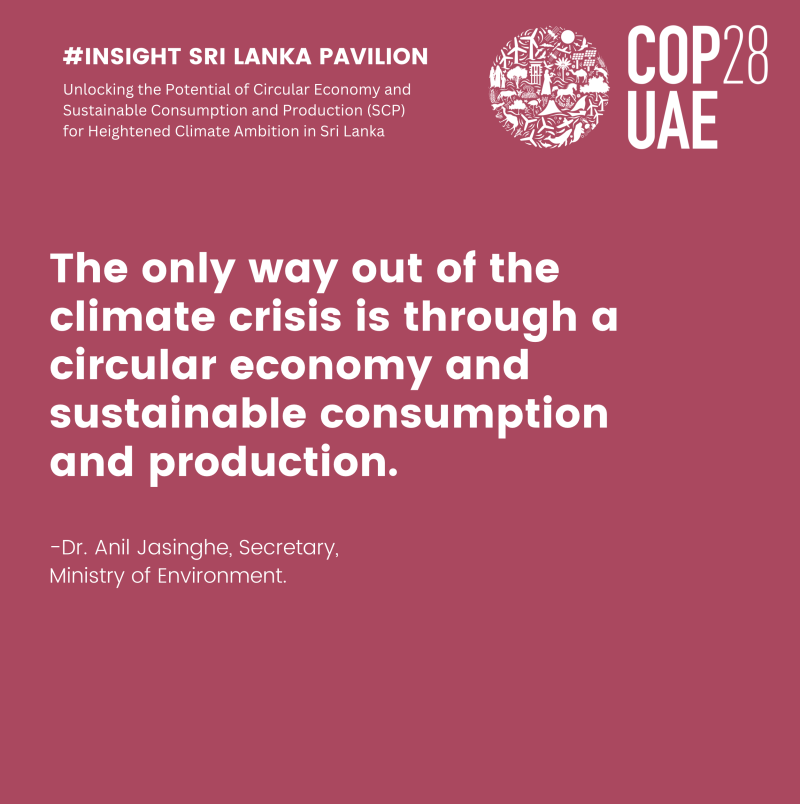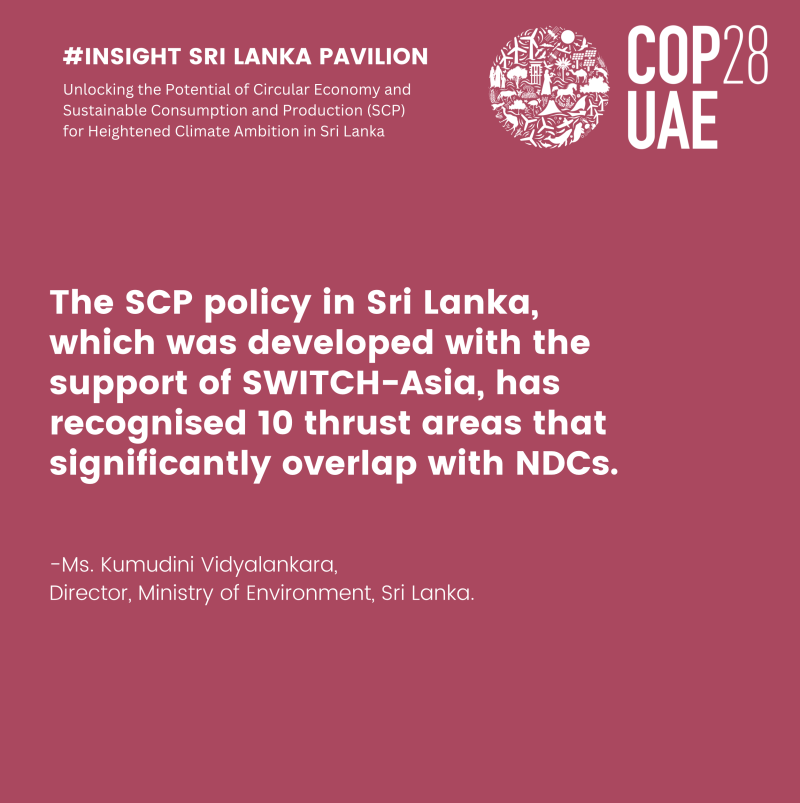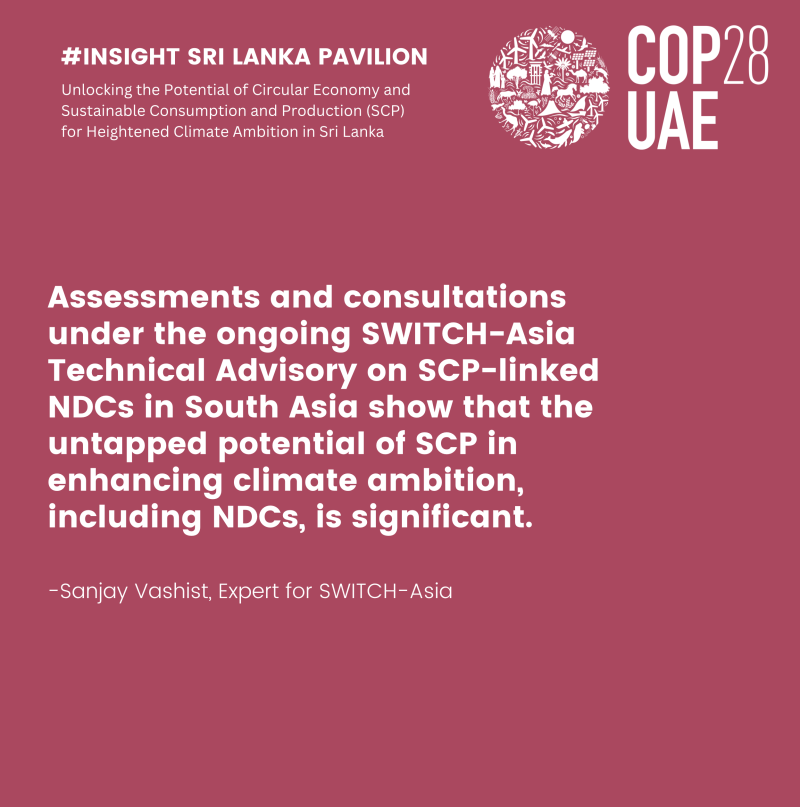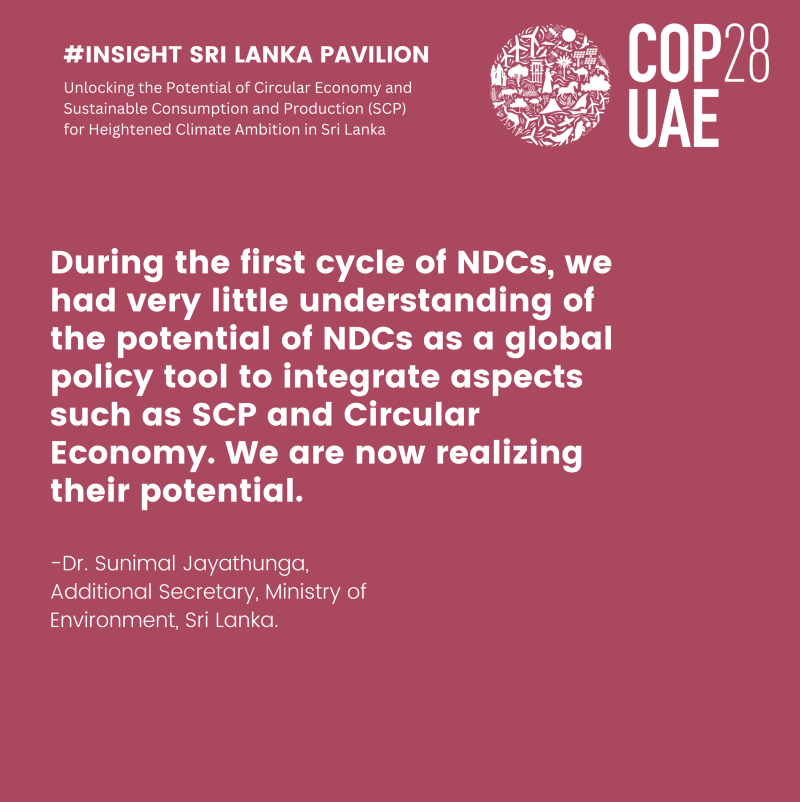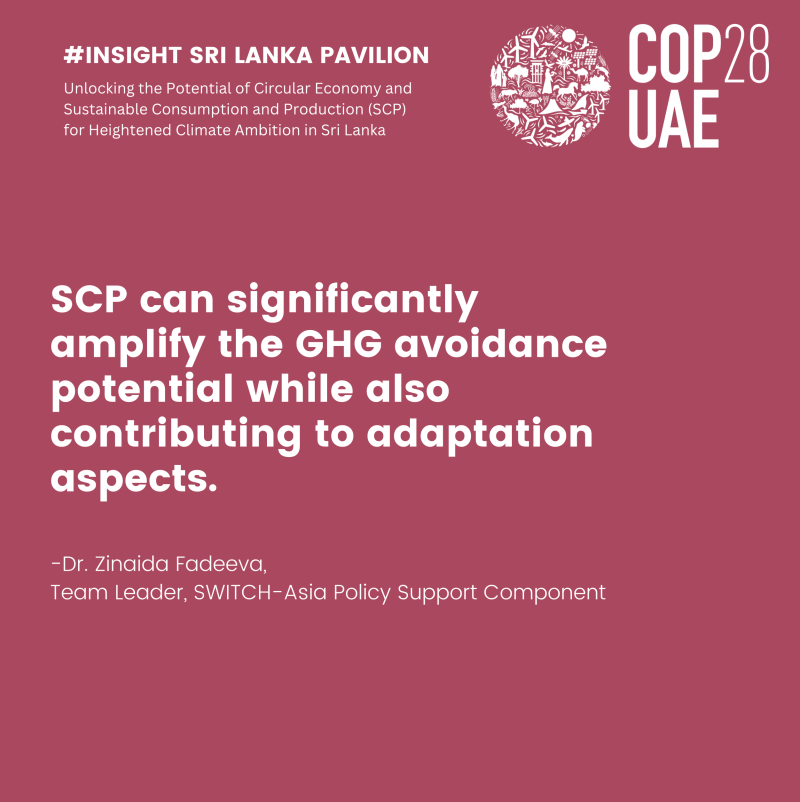
Dr. Zinaida Fadeeva, Team Leader, EU SWITCH-Asia Policy Support Component
What are your expectations regarding COP 28, and where do you see SWITCH-Asia’s work as most relevant?
While we take a systems-thinking approach in our work, our technical advisory projects with governments in the Asian region often focus on shifting policies specific to sectors. At COP, this sector perspective is particularly helpful to get from commitments to action.
For example, in the building sector, we are preparing the ground for sustainable building standards which in turn encourage innovation and investment into circular construction and building management. This focus on circularity is crucial for achieving a transformation to low-carbon, resource-efficient economies that enable wellbeing for everyone. SWITCH-Asia is working with stakeholders in our Asian partner countries towards an integration of sustainable materials, energy-efficient designs, and maintenance issues into their building legislations. This approach not only reduces the carbon footprint of buildings during construction and prolongs their use phase, it also promotes the reuse and recycling of building materials, thereby “closing the loop” both for materials and in shifting energy consumption and production towards Paris compatibility.
Our goal at COP 28 is to highlight the potential for significant carbon reductions in the building sector through these circular economy practices, and we support the multi-state “Buildings Breakthrough” coordinated by the Global Alliance for Building and Construction (Global ABC) to be launched on December 6.
What are other topics that you will be closely monitoring and where do you see a chance for SWITCH-Asia to contribute?
Another “hot topic” at the moment is plastics, not least because of the ongoing negotiations for a global plastics treaty. Here, circularity is an equally vital concept. In our analytical and advisory work, we look at the full lifecycle of plastic products, emphasizing the need for global strategies that reduce plastic waste and promote recycling and reuse. Our work in transitioning towards circular models - reducing single-use plastics, encouraging the development of sustainable alternatives, and, as a last step, improving recycling systems - is where I see SWITCH-Asia making a significant impact. Also, in bringing attention to the fact that the growth in plastics production is diametrically opposed to lowering emissions. As a fossil-based material, big oil corporations have identified plastics as an opportunity to continue oil production, even if our energy and transport systems shift away from burning oil, coal, and gas. At the same time, many companies are fully aware of the pending shift and are preparing accordingly, for example, the members of the Business Coalition for a Strong Plastics Treaty. Of course, another key sector is the agri-food sector, which will be of particular importance at this year’s COP.
In which way is the agri-food sector of particular interest regarding this year’s COP and climate in general, and how does this connect to SCP?
While the current food system has supported a fast-growing population and fueled economic development, productivity gains have come at a cost. The food industry is responsible for almost a quarter of greenhouse gas emissions globally. Meanwhile, mismanagement of fertilizers has caused pollution of waterways and chemical pesticide use has degraded the natural resources on which the food system depends. These practices harm ecosystems and impact our health. At the same time, food has been a missing piece of the puzzle in climate negotiations during the previous COPs.
This will be the first COP to have a major focus on food systems, their sustainability, and acknowledge their critical role in achieving the Paris Agreement Goals. Besides dedicating a day to discussing food, agriculture, and water on December 10, in the COP28 Food Systems and Agriculture Agenda, there is a call on world leaders to sign on to their COP28 Declaration on Resilient Food Systems, Sustainable Agriculture, and Climate Action. The declaration recognizes the link between food systems and climate change and invites national governments to align their national food systems and agriculture strategies with their Nationally Determined Contributions (NDC) under the Paris Agreement.
Incorporating Sustainable Consumption and Production as well as Circular Economy principles into NDCs can support this process. The food system can be fundamentally redesigned to actively tackle climate change and biodiversity loss, and promote human health, while reducing the overall costs to society. By reconnecting communities with local food production and changing the way we grow food, design food products, and handle by-products and waste, we can create a circular economy for food that provides key benefits for society and the environment, such as improved nutrition, thriving local communities, healthier ecosystems, and a significantly reduced climate impact.
The SWITCH-Asia programme has recognized the critical importance of the agri-food sector in the circular economy. More than 30 SWITCH-Asia grant projects since 2008 have been making significant impacts in the agri-food sector across the region — currently active ones are located in Lao PDR, Vietnam, China, Mongolia, India, Uzbekistan, and Tajikistan. They cover subsectors such as coffee, cacao, poultry, bamboo, organic food farming, food and beverage, and cold chain logistics. Policy support advisories in the agri-food sector were conducted in Kyrgyzstan, Tajikistan, Vietnam as well as for the whole region.
SWITCH-Asia, being an EU project, which EU policies and negotiation items do you expect to raise most questions from Asian countries?
From 2027, with its Carbon-Based Adjustment Mechanism (CBAM), Europe will start levying carbon tariffs on goods imported into the EU in order to speed up decarbonization efforts outside Europe and keep EU production sites competitive despite factoring in carbon costs. Select products like electricity, steel, cement, aluminum, and fertilizers will be first in line before the scheme is eventually extended to other sectors.
Many countries worldwide, including Asian countries that export such goods to Europe, such as China and India, have expressed strong criticism of the EU scheme. They consider it puts undue burden on developing countries, while the EU has explained that it is not a ‘penalty’ for importers to the EU, but an incentive for decarbonization in the EU which is in line with its member states’ climate commitments. In fact, while Europe is creating one scheme, CBAM, it is abolishing another, free allowances of its Emission Trading System: the burden is shifting from states and their people, who suffer the consequences of climate change, to heavy industry. The overall objective is to stimulate global decarbonization of heavy industry. COP will be an opportunity for the EU to explain the details of the CBAM to all parties and also to find pathways to support a Just Transition towards decarbonization of heavy industry. The EU supports these transitions in Asia and worldwide through its partnerships and through projects such as SWITCH-Asia.
Recently, there was some debate about the presence of corporate lobbyists, specifically fossil lobbyists, present at COP. What do you think about this?
I wholeheartedly welcome the presence of businesses, especially those representing businesses that are willing to look beyond the current fossil fuel-based status quo of our economies. Their participation reflects a growing acknowledgment within the business community that moving towards SCP is an important part of a viable business strategy. Companies are increasingly recognizing that there's a robust business case for embracing renewable energy, circular economy models, and low-carbon technologies. This is also the experience of our recently launched advisory project with selected ASEAN countries. We work with corporate pioneers on developing their contributions to SCP through circular economy strategies. The participating companies are fully aware of the challenge ahead, and we expect interesting impulses from this.
It's also important to remember that lobbyists are the voices of their respective industries or sectors, and their presence is a fundamental aspect of how policy and business intersect. However, we must acknowledge the current misalignment between their incentives and the urgent priority to curb emissions. This discrepancy is where COP must now focus its efforts, and the intervention points are multi-faceted – from national commitments, as well as policy and programming to climate finance and technical cooperation, to changing key aspects of the financial system that is currently not reflective of the shared understanding that climate change is a catastrophe in the making. COP meetings should not just be about negotiations and declarations but also about bridging these gaps and finding common ground where the business sector's drive for innovation and profitability can be used to create momentum for sustainability, making them part of the solution rather than singling them out as “the problem”.
Addressing this discrepancy is not just about policy change; it's about a cultural and mindset shift in the business world. It's about seeing the bigger picture and understanding that businesses can only thrive in stable circumstances, and we are on the brink of entering an age of climatic instability that will put many businesses at risk.
What do you hope for COP 28 to bring forward regarding the integration of SCP and climate agendas?
The upcoming COP28 holds tremendous significance as it marks the conclusion of the first-ever Global Stock Take (GST) under the Paris Agreement. Despite scientific insights from key reports such as the IPCC 6th Assessment Report, the Emission Gap Report 2023, and the Synthesis Report of GST, it is evident that we have deviated from the desired pathways outlined in the Paris Agreement. The stark reality is that we now face a narrow, costlier, and more challenging route to avoid breaching the critical 1.5°C temperature rise threshold. Urgency is paramount, making it imperative to explore and implement all conceivable measures to redirect ourselves toward the transformative pathways crucial for achieving our climate objectives.
In this context, Sustainable Consumption and Production (SCP) emerges as a readily accessible solution, capable of making significant contributions to climate action while concurrently yielding sustainable development co-benefits. Notably, there is a surge in interest among stakeholders in integrating SCP into the climate agenda. Although many countries are already undertaking SCP actions, these efforts often go unreported or unnoticed within their climate strategies.
Looking ahead, I am optimistic that COP28 will serve as a pivotal milestone, fostering a deeper connection between climate goals and SCP. As countries and stakeholders gear up for the next round of Nationally Determined Contributions (NDC) enhancement in 2025, the stage is set for a collaborative effort to strengthen the synergy between climate action and sustainable consumption and production.
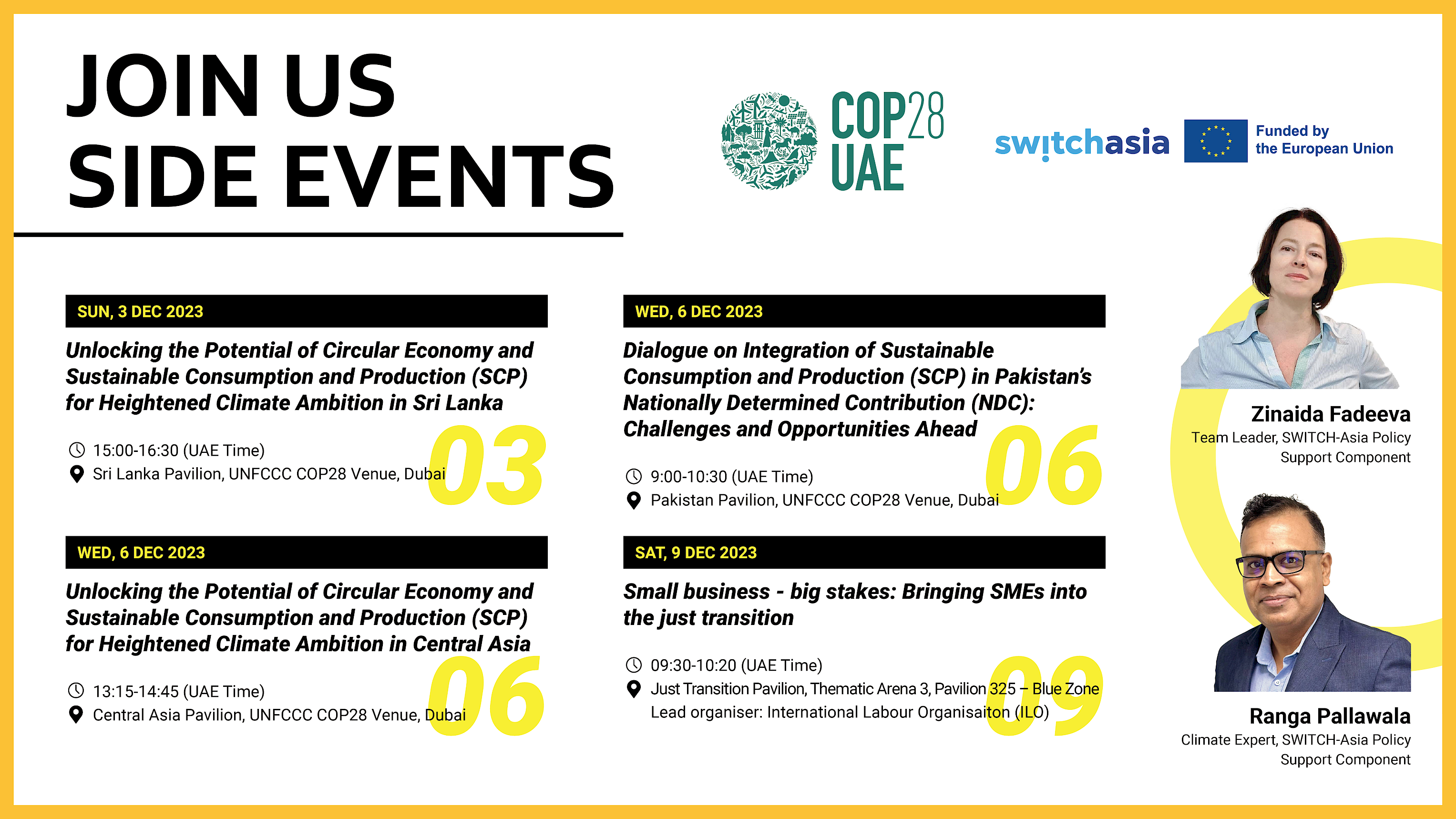
Key Takeaways: Unlocking the Potential of Circular Economy and Sustainable Consumption and Production (SCP) for Heightened Climate Ambition in Sri Lanka

